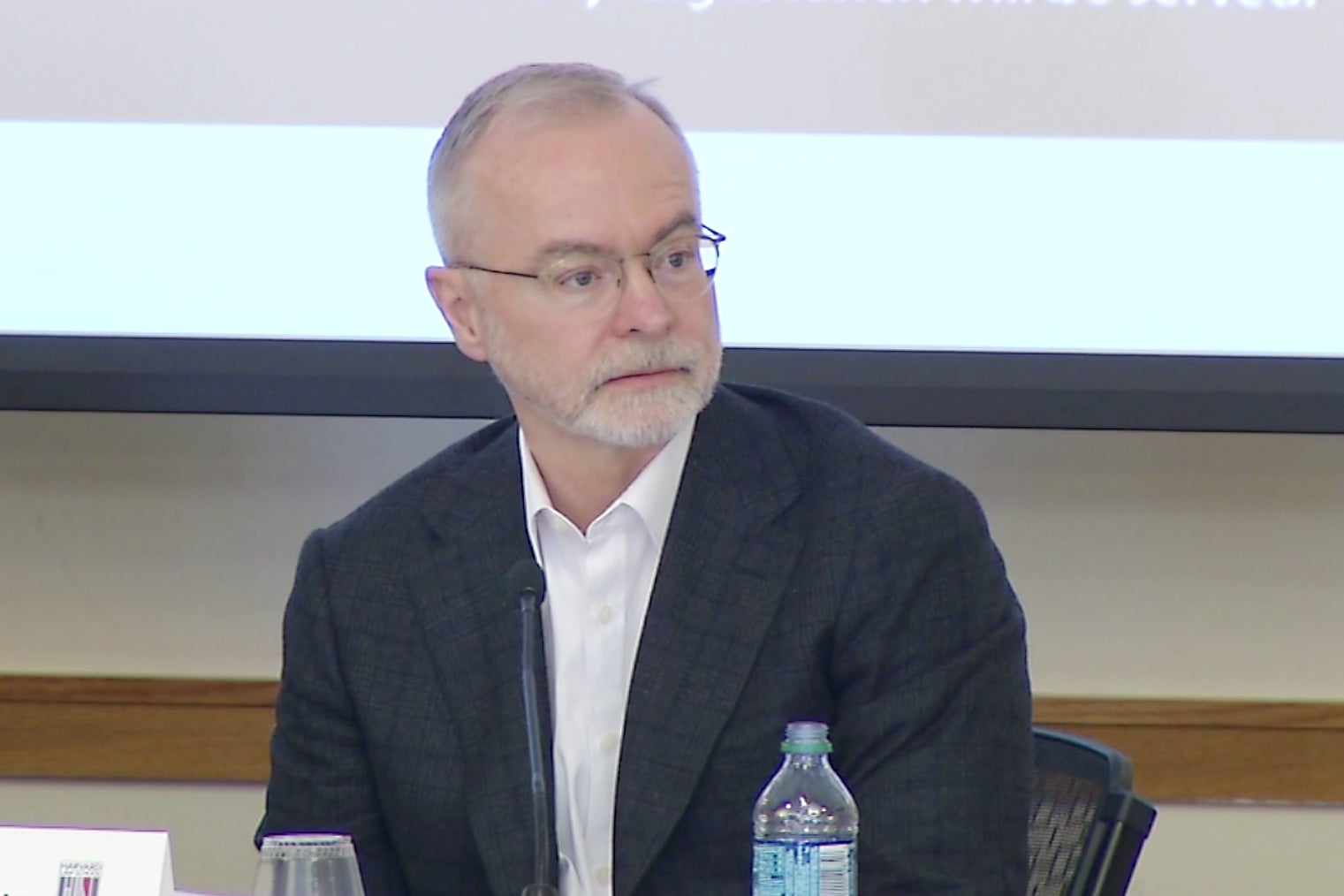Harvard Law Professor David Kennedy ’80 routinely asks his students: Is the world today like it was in 1648, when a long war ended and an era of reinvention began? Or is it more like 1945, when the international order seemed to need reforming? For today’s generation, he contends, to remake the world will be just as difficult as it was in 1648.
In his latest book,“A World of Struggle: How Power, Law, and Expertise Shape Global Political Economy,” Kennedy points to widespread uncertainty and ambivalence about the world and explores “the role of expertise and professional practice in the routine conflicts through which global political and economic life takes shape.”
Kennedy presented the book’s ideas at a recent talk at Harvard Law School on March 9. He said: “[I]n broad strokes, [it] develops three big themes: first, a picture of the international situation, a way to think about global political economy; secondly, a proposal for thinking about the power of knowledge and the work of expertise in the world, a story about what we might think of as ‘technocracy’ or ‘managerialism’ and how it actually functions in the world today; and third, a story about what law has to do with those things–law’s distributive role first in global political and economic life but also its articulative and performative power in the struggles that people have with one another.”
As part of the event, Professors William Fisher ’82, Janet Halley, Samuel Moyn ’01, and Lucie White ’81 participated in a panel discussion on Kennedy’s book. (see video above) The event was hosted by the Harvard Law School Library, which sponsors a series of faculty book talks throughout the academic year.
Kennedy is the Manley O. Hudson Professor of Law and faculty director of the Institute for Global Law and Policy at Harvard Law School, where he teaches international law, international economic policy, legal theory, law and development and European law. He is the author of “The Rights of Spring: A Memoir of Innocence Abroad”; “Of War and Law”; and “The Dark Sides of Virtue: Reassessing International Humanitarianism.”
***
from Princeton University Press
David Kennedy on remaking our technocratic world
Kennedy recently participated in a Q&A with Princeton University Press on his new book.
Why a world of “struggle?”
DK: In this book, I try to reframe the international situation less as order or system than as a continual struggle, hence the title, A World of Struggle. When speaking about international affairs, the social sciences often start with conflict – a Hobbesian state of nature or the competitive market of Adam Smith – and then work to explain how things nevertheless turn out well ordered: through a “balance of power” or “invisible hand.” In my picture, thousands of conflicts undertaken by all sorts of people at once generate the world we live in, including terribly unjust things it seems impossible to change. Struggle and conflict are more prevalent and constitutive of our everyday world than we realize.
You write about knowledge and expertise – aren’t economic and military power more important in global struggle?
DK: It’s true, I am particularly interested in the role of ideas. I do think they’re more important than we realize. Although we think of international affairs as an arena of raw power, a great deal is argument and assertion. People drop bombs to “send messages” and transform economic power into a better deal through negotiation. In the shadow of coercion more often than through force.
People in places like Davos or Washington tell lots of stories about the world: stories about what an economy is, what politics can accomplish, about the limits and potential of law. Their stories make some problems visible, some actors central – and others invisible. The technical work people undertake as they struggle in the shadow of these stories arranges the world, distributing wealth, status and opportunity. In the book, I examine big ideas about things like economic development, international law or world trade to understand how they frame and fuel everyday battles for advantage among businessmen, bureaucrats, politicians and citizens.
Are experts too important in world affairs? Lots of people criticize the European Union, for example, as “technocratic” and decry the “democracy deficit.”
DK: Our world is a technocratic one. Experts have lots of authority and it is difficult to change things without speaking their language. And, as we all know, technocratic language is as prone to irrationality, confusion and conflicting objectives as any other. But “expertise” is not the exclusive province of specialists and professionals. All of us, from politicians, to entrepreneurs, to activists speak some vulgate version of languages once owned more exclusively by “experts.” As a result, it is not so clear there is a “political” or “democratic” alternative once democracy and rulership have themselves become technocratic practices.
To me, the problem is not experts run rampant, displacing more appropriate political, ethical or commercial ways of thinking. The problem is all of us – our human capacity for responsible decision and political engagement has been dulled. Or perhaps, like professional talking heads, we’ve all embraced the reassuring comfort of thinking we “know,” rather than face the anxiety of having to choose.
You can read the full Q&A on the Princeton University Press blog.
